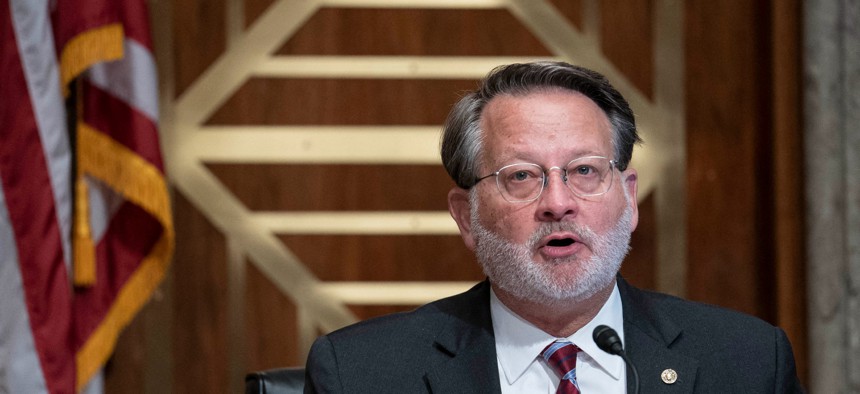
Sen. Gary Peters (D-Mich) chairs a Senate hearing in May 2021. Sarah Silbiger / AFP via Getty Images
Lawmakers Are Considering Updates to Records Management Legislation
Experts told lawmakers at a Senate hearing on Tuesday that updates to federal records legislation are needed to put the National Archives in charge of presidential records.
Gaps and deficiencies in federal records legislation represent a threat to government transparency and accountability, experts and lawmakers said at a Senate hearing on Tuesday.
Sen. Gary Peters, D-Mich., chairman of the Homeland Security and Governmental Affairs Committee, says that a legislative update is in the works.
"I remain confident that this is a body that can work together on a bipartisan basis and we can work to improve the federal recordkeeping process," he said. "I am currently working on legislation that will increase visibility. It will strengthen existing laws, update regulations and modernize this process by using emerging technologies so that we can ensure that NARA can adequately preserve and provide appropriate access to … all federal records."
The Senate hearing was held in the wake of revelations that the National Archives and Records Administration (NARA) had to retrieve missing records containing classified information taken from the White House by former president Donald Trump and held at his Mar-a-Lago resort. The House Oversight and Reform Committee has since launched a probe into the missing records.
Trump's records management practices – including tearing up and discarding documents – make for headline news but at the hearing lawmakers and experts said that violations of the Presidential Records Act and the Federal Records Act are routine.
"Officials in previous administrations of both parties have failed to adhere to current federal recordkeeping requirements and, in some cases, have blatantly disregarded them," Peters said. "These failures to appropriately handle presidential and federal records have limited… transparency for the American people and risk letting critical moments of our nation's history slip through the cracks. This has left the door wide open for historical misrepresentations and distortion," he continued.
Technology presents a challenge and opportunity for records managers and future legislation. One key concern is encrypted messaging applications that destroy data as a feature.
These apps are an "existential threat to government recordkeeping," said Jason R. Baron, a former Department of Justice and NARA official who currently teaches at the University of Maryland.
"Such messages, when used by officials on matters relating to government business, simply vanish from history," he continued.
Although witnesses differed in some of the specifics of their recommendations, all told lawmakers that a statutory change was needed to either ban the use of all of these types of apps or ban their use other than for specific apps that agencies or White Houses have approved, with provisions for backing up content for preservation.
Another looming challenge is the ability of the archives and agencies to handle the increasing number of electronic records. A 2019 policy requires agencies to manage permanent and temporary records electronically comes into effect Dec. 31, 2022. NARA stops accepting newly created paper records on the same date, Baron noted.
He suggested that Congress and agencies jumpstart the use of artificial intelligence, machine learning and data analytics to deal with this. An advisory body of experts would be helpful, Baron advised in his written testimony.
"Without employing advanced search technologies and advanced analytics, agencies are going to be under an increasingly huge burden in categorizing their records, disposing of their records in accordance with records schedules and providing access to those records to Congress and to the American people," said Baron.
Congress could also rework the current statute that gives the president wide discretion in what is worthy of being preserved or not be modified, said Anne Weismann, Outside Counsel for Citizens for Responsibility and Ethics in Washington and the Project on Government Oversight, and Jonanthan Turley, Professor at the George Washington University Law School.
Weissman suggested establishing a rule that all presidential records merit preservation, with NARA having the power to dispose of any not needing to be preserved.
"We now have reason to question the efficacy of the norm-based system that underlies the [Presidential Records Act]," Weismann said. "It is therefore up to Congress to transform the PRA to a statute that achieves its intended purpose."
NEXT STORY: The Senate Confirms Biden’s OMB Director







